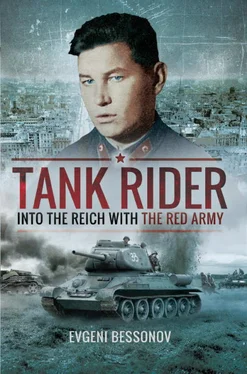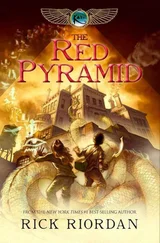In general, the battles were heavy and the Germans put up stubborn resistance. That was the only case when such a large number of soldiers surrendered. Even in this case it was only privates and recruits that surrendered, while officers and NCOs slipped away, they were afraid of us. I also saw boys of 14 or 15 years old from the Western Ukraine, dressed in German uniform. They served in anti-aircraft artillery, which was in action against the Russian, and American air force. They also served as telephone and radio operators and observers.
In early April 1945 they sent a Major to our battalion to be the deputy battalion commander for personnel. General Lelyushenko, commander of our Tank Army, sent this Major to our battalion as a punishment for some wrongdoing at the office of the head of cultural section of the Army. He did not fight the war for long with us. Once we rushed storming into a village, where Germans put up insignificant resistance, firing Panzerfaust missiles. Our tanks were waiting for the company to drive the Germans out of the houses. Again my soldiers and I were the vanguard of the battalion and the Major somehow happened to be with us. He ordered us to move forward in that village, but I told him that we had to look around, spot the enemy’s weapon emplacements and only after that we could start an assault. We entered a house with him and my men; I walked up to a window and started to look at the nearby houses. I did not like the feel of it, I don’t know why, but I ordered: ‘Quickly out of this room, go to the other room, that one!’ The Major first tried to resist, but then followed us, and then an explosion, followed by another one, shook the air. It grew quiet again. We peeped into the room that we had just left and saw that Panzerfaust rounds had destroyed the wall at which we had just stood. What rescued me? Intuition? Luck? The Major again started to hurry me with the assault, but I tried to talk him out of it, saying that first we had to fire on the house windows at least with submachine-guns. The Germans had not yet abandoned those houses. He did not believe me and decided to capture the nearest house with several soldiers, telling me that the house was empty. As soon as he walked into an open spot from behind our house, the Germans fired on him; he was wounded and lay down in a ditch, calling for us to come to his rescue. We pulled him into a safe place, bandaged him and I ordered my soldiers to carry him into our rear. The Major was lightly wounded in the buttocks. He thanked me as he said good-bye and acknowledged that he had been wrong.
After his departure we fired on the German ambush with machine-guns and kicked the Fritzes out of that village. Some of them fled, others were killed during the battle, while some were taken prisoners. Under cover from one team of soldiers, the other assault team would reach a building and toss hand-grenades in its windows. It was not an easy task and took a great deal of courage and bravery! Tanks also helped us with fire from their main guns; my soldiers pointed out targets for them. I had casualties, but I fulfilled the order. The battalion commander walked up to us. We laughed at the wound of the deputy battalion commander in his buttocks. With everyone laughing, I told the story of Major’s wound and how he groaned, being scratched in his ass and almost dying from fright. The battalion commander gave us a new mission. We were briefed and again moved forward, in front of the Brigade.
The end of the war was drawing near, but while the Berlin operation continued, we were in battle every day, breaking the enemy’s resistance and losing men and equipment in battles. Most of the population had left the houses around Berlin. Those who stayed in their houses and apartments hung white linen out of their windows, showing that they surrendered and were at the winners’ mercy. Some German civilians informed us about where German soldiers had dug in, who was a Nazi, who had tortured Russian prisoners of war or those who were sent to Germany for forced labour. All kinds of things happened.
The offensive continued successfully. Sometimes we drove forward in one column, which had the Brigade’s staff, medical vehicles and the battalion’s field kitchens in it. To be honest, I did not like such a concentration of vehicles, as it only frustrated the combat companies. We also did not need the kitchens, as we mostly fed on the German cattle and poultry. The soldiers had a great time in that respect, they cooked what they wanted. We mostly ate poultry – geese, ducks and turkeys. We ate pork more rarely. In battles we continued to guard the tanks from the Panzerfaust teams and point out targets for them. I was again ahead on three tanks with my company, while the main body of the Brigade was setting a rest place. No one would tell me what to do, no one threatened me or advised me – it was nice!

During the day of 24 April, 1945, we rushed into Schmergov. The Fritzes fled and we captured the village straight away. We moved forward a bit and stopped in front of a water obstacle – the Havel channel. There was no bridge, while the channel was up to 150 metres wide and was deep and navigable. Before that channel we had already crossed the Bober, Spree, Neisse, channels Teltov, Hogenzoller, Hute and other water obstacles. Parez and Ketzin towns were on the other side – these were our last towns on the route of our Brigade. The Brigade was supposed to join up with units of the first Belorussian front at Ketzin, thus completing the encirclement of Berlin. The main body of the battalion, the artillery battalion and the remaining tanks of the tank regiment drove up. The 2nd and the 3rd battalions were sent to Brandenburg in the meantime. There they encountered strong resistance from the enemy – the Germans had plenty of infantry and even Tiger tanks, but united the battalions drove the Germans out of the city. The battle for the city was intense; the enemy had numerical superiority, but Brandenburg was captured and the enemy suffered heavy losses. I learnt about all those things from the stories of my friends from these battalions.
Colonel Turkin, Majors Kozienko and Stolyarov and other officers walked up to the channel. All was silent. The battalion commander called me up and asked me where Chernyshov was. I answered that I did not know and I was the only officer in the company. Major Kozienko ordered me to find several good swimmers, volunteers, cross the channel and bring a ferry on the other side of a channel in order to transport the rest of the company. The Germans were nowhere to be seen; no one was firing at us. Three or four brave guys volunteered, they swam across the channel; no one fired on them on the other bank and they were able to bring the ferry to our side.
Kozienko sent me across with a dozen soldiers. We did not know the capacity of the ferry, but eventually we crossed the channel safely. We went up to a mound, lay down behind it and spotted four Tiger tanks ahead of us. They were standing in a garden some 60 or 80 metres from us. The gardens were in full blossom and we could not see the tanks clearly. I sent a soldier back across the channel to report about the tanks to the battalion commander. The tanks were standing there quietly and did not show any signs of life. The entire company crossed the channel and we lay down behind this natural shelter. The battalion’s battery – two 57 mm guns under the command of Lieutenants Kharmakulov and Isaev – also crossed the channel. Company commander Chernyshov also finally came running to us, he looked around and told me: ‘Let’s assault, not towards the tanks, but to the right, towards the city.’ I objected, saying that the tanks would kill us there and squash us all with their tracks. I told him that we had to wait for our artillery to knock the tanks out first. The problem was that the tank crews of our tank regiment were really bad shooters. The Tigers, in contrast, first damaged one tank on the other side and then knocked out the second one. Lieutenants Shakulo, Mikheev and Guschenkov were away in hospitals, and Chernyshov and I were the only officers that remained in the company. Chernyshov ran to the right flank of the company and got Shakulo’s platoon up to attack. Soldiers started to advance in short rushes towards Ketzin between the ugly houses and structures, closer to the road. He should not have done it, he could have lost his soldiers and have died himself, but he did not even listen to me, just cursed at me, while I could not stop him. I did not send my soldiers to attack in such a careless manner – the war was about to be over, why should I have shown such bravado? Chernyshov, however, was out of control and would often make a show.
Читать дальше













